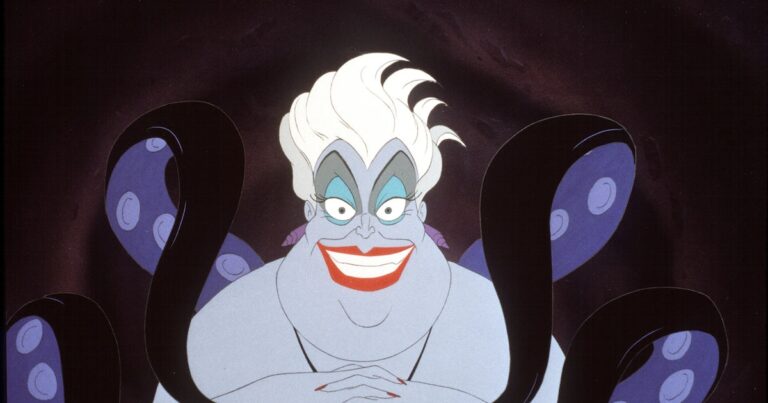
[ad_1]
Unless you’ve been living under a rock for the past three decades, you are most likely very familiar with the widely popular animated Disney film The Little Mermaid, which just hit theaters in live-action form on May 26. The story chronicles the adventures of a young mermaid named Ariel, who desperately wants to explore what life is like above the depths of the ocean. This desire leads her to make a deal with Ursula, a sea witch who grants her the ability to temporarily become human for three days. However, for the change to be permanent, she must experience true love’s kiss — and if she fails, she belongs to the sea witch. Oh, yeah, and she has to do all of this without the use of her voice. No pressure or anything!
Obviously, the terms of such an agreement are not ideal, and it’s easy to cast Ursula into an unflattering light based on this rather dark proposition alone. Then, of course, there’s the fact that she’s been seemingly banished from King Triton’s kingdom, presumably for a good reason, though no specifics are given throughout the movie. The bottom line is that we, as a society, have unanimously associated Ursula with being evil. Ask pretty much anyone, and they will agree that Ursula is bad. But… is she really? Upon further inspection, I believe this tentacled, tenacious tycoon isn’t the villain people always make her out to be. In fact, I’d even go so far as to say that Ursula isn’t a villain at all.
She’s Career Oriented
You may not like her tactics, and some loopholes were definitely written into the contract Ariel signed that allowed Ursula to hedge the bets in her favor. But that’s the thing — there was a legit contract. For the most part, Ursula was very upfront about what Ariel was getting herself into and the repercussions she would suffer if she failed. If you go back and listen to the actual lyrics in “Poor Unfortunate Souls” (which we can all agree is an absolute bop, right?), you hear her lay all the cards out on the table and even admit that past contracts haven’t always had a happy ending. “Now it’s happened once or twice/Someone couldn’t pay the price/And I’m afraid I had to rake ’em ‘cross the coals,” she sings to Ariel. “Yes, I’ve had the odd complaint/But on the whole, I’ve been a saint/To those poor unfortunate souls.”
Sure, she’s trying to paint herself as more of a do-gooder than she actually is, but doesn’t everyone trying to pitch themselves to potential clients do that? She could’ve chosen not to mention the possible downside to the agreement, but she didn’t, which implies some sort of moral code. So, you have to start asking yourself — is that the mark of a villain or just a really shrewd businesswoman?
She Gave Ariel a Choice
Things took a turn when Ursula’s plan didn’t come to fruition as she had hoped, but before that, she gave Ariel the power to make her own decision about her future. Again, there was even a contract involved, which Ariel herself needed to sign. She wasn’t forced to do it. She willingly agreed to the terms. Was it foolish? Probably. But she was given the autonomy to make it anyway, which is more than what her father ever did for her. His anger when he found her secret cave of human trinkets was extremely unnecessary and a textbook example of toxic masculinity. He thought he knew what was best for her, and while it may have come from a place of love and concern, his approach to controlling her wants and actions drove her to Ursula in the first place. So honestly, who’s the real villain there?
Without Ursula, There’s No Happily Ever After
Love her or hate her, Ursula is the central reason Ariel and Prince Eric end up together at the end of the movie. Without her involvement, Ariel couldn’t have left the ocean and fallen in love with the man of her dreams. She would’ve just remained a mermaid forever, always wondering what her life could’ve been like. But instead, those dreams became a reality — and that’s all because of Ursula. So moving forward, let’s try to see Ursula as more than a villain. Because, in truth, she’s secretly the ocean’s most successful matchmaker of all time.
[ad_2]